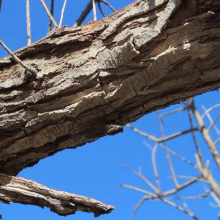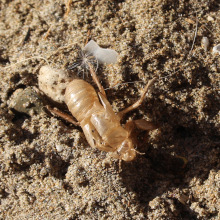Do you think you know all about cicada ( a democratic, misunderstood hero )? Share it on Facebook
 There isn't day in Greece, during the summer, without the sounds of cicadas. Some people bothered, others calm down, however, the cicada, is the most popular summer star.
There isn't day in Greece, during the summer, without the sounds of cicadas. Some people bothered, others calm down, however, the cicada, is the most popular summer star.
The legend of Tithon is also associated with the Cicada. Tithon was a mortal who had been made immortal by the gods at the request of Eo ( the divinity of dawn ), but forgot to ask to remain young. So when Tithon arrived at his last old age, Eo, who was immortal and always young as a goddess, could no longer see him. Then the gods saddened him and transformed him into a creepy insect that speaks incessantly, the cicada.
Around the world there are at least 2,500 types of cicada, which can be roughly divided into three categories. Some live 17 years under the earth, some 13, some others 4. The six types of cicada we find in Greece are those that live 4.
 The volume of cicada song can reach up to 160 db, as much as the noise next to a running airplane engine! Each type of cicada has at least three melodies, but the main one is the male's erotic call to the female. The male, is actually deaf and has a system of "drums" (which pulse 300 to 900 times a minute) as well as large chambers (resonators). The system is affected by the humidity of the air - hence the weird breaks in the morning and evening.
On the contrary, the female does not have such a sound system and thus remains silent. But it listens, and joins the male that sings best, and eventually lays its eggs in a dry twig that pierces for that purpose. In October, the nymphs will come out and begin digging the ground to find roots to suck. Until they come to the surface after a few years and transform into cicadas and continue the life cycle.
The cicadas feeds by dipping an antenna into the branch on which it sits and sucking the juice from there. Around it gather various insects, mainly hungry ants, that try to sneak a sip of juice. When this gets too annoying, cicada, changes position by flying, after literally pee the annoying insects!
The volume of cicada song can reach up to 160 db, as much as the noise next to a running airplane engine! Each type of cicada has at least three melodies, but the main one is the male's erotic call to the female. The male, is actually deaf and has a system of "drums" (which pulse 300 to 900 times a minute) as well as large chambers (resonators). The system is affected by the humidity of the air - hence the weird breaks in the morning and evening.
On the contrary, the female does not have such a sound system and thus remains silent. But it listens, and joins the male that sings best, and eventually lays its eggs in a dry twig that pierces for that purpose. In October, the nymphs will come out and begin digging the ground to find roots to suck. Until they come to the surface after a few years and transform into cicadas and continue the life cycle.
The cicadas feeds by dipping an antenna into the branch on which it sits and sucking the juice from there. Around it gather various insects, mainly hungry ants, that try to sneak a sip of juice. When this gets too annoying, cicada, changes position by flying, after literally pee the annoying insects!
 So, the lonely cicada has dug the ground for years to feed itself without the social protection of an organized nest to support it. And when cicada gets into retirement, or if you like, when it's on vacation, after years of hard work deep in the ground, it starts singing with all its strength for four or five weeks. Until it mates - really how long does its pleasure last? - and then fall to the ground where it dies exhausted.
And while it sings, it suffers from the exploitation of others without having an organized army and no lethal sting to protect itself. It will simply change position by pee his annoying exploiters. And it will continue to sing, inviting the beautiful female cicada, and audibly marking our summers, this lonely, democratic, and persistent summer troubadour, this misunderstood hero.
So, the lonely cicada has dug the ground for years to feed itself without the social protection of an organized nest to support it. And when cicada gets into retirement, or if you like, when it's on vacation, after years of hard work deep in the ground, it starts singing with all its strength for four or five weeks. Until it mates - really how long does its pleasure last? - and then fall to the ground where it dies exhausted.
And while it sings, it suffers from the exploitation of others without having an organized army and no lethal sting to protect itself. It will simply change position by pee his annoying exploiters. And it will continue to sing, inviting the beautiful female cicada, and audibly marking our summers, this lonely, democratic, and persistent summer troubadour, this misunderstood hero.
It is the cicada that chants the hymn to beatiful life, which can be also difficult, and unlucky, and little. It is the one that tirelessly shouts us: "It's summer! It's time for joy! The time of love!"




